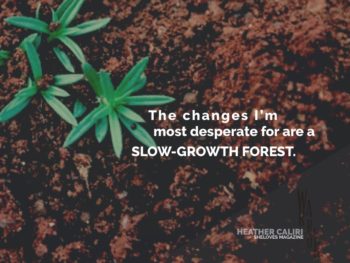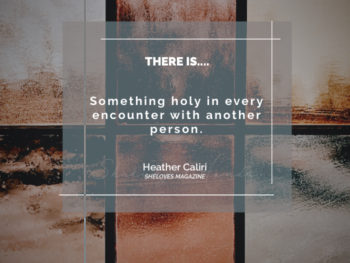
“I am going through another spell of finding it difficult to read the Bible. I never know quite what to make of it. I don’t feel guilty at all about it and I know it won’t be long before I return to it again with renewed zest. . . True, there is always a danger of indolence, but it would be wrong to get fussed about it. Far better to trust that after wobbling a bit the compass will come to rest in the right direction.”
Dietrich Bonhoeffer, quoted in Opening the Bible, by Thomas Merton
I was talking to a friend about my book project, and letting go of a sense of obligation about the Bible.
She gets it; she’s had her own ups and downs with faith.
But she wondered, “But is it really a good idea to give people permission to not read the Bible? What if they let themselves off the hook?”
That, my friends, is a very good question.
And my question back to her was: which would we rather have?
- A person who doesn’t read the Bible, but is praying to be given a new heart for the Word? Who asks God to open new avenues of connection to Him?
- Or a person who reads it daily, without fail, with a sense of duty? Who checks the scripture verses off of their to-do list? A person who feels trapped by the Bible, and reads it out of fear, feeling shame when they don’t have the “right” attitude?
Reading the Bible is great. Lovely.
But unless we are radically submitted to God, anything can be an idol. Including Scripture.
Is reading the Bible every day what brings the Spirit into our lives? Or is it over and over dying to ourselves, our sin, our idolatry, our religious systems, our conception of what God wants from us?
We need to know that God is God, and the Bible, however important, is no substitute for the Word Himself. We need to know all that as we open Scripture.
I honor those who are able to read the Bible daily, joyfully, who have found daily practices that are submitted to God and are life-giving.
But I don’t think we should aspire to read the Bible regularly.
No, I think we should aspire to complete vulnerability to God. And I think sometimes that looks like setting the Bible aside.
Because if we’re aspiring to Bible reading, if regular time in the Bible is our goal, then we’re making an idol out of the Good Book.
And if we’re worried about giving people permission to stop reading the Bible—if we think they need OUR permission to read it or not–we’re usurping God’s authority. We’re deciding ahead of time how God might lead our brothers and sisters to become fully devoted to him.
It’s worth noting that the ability to read the Bible every day is a recent occurrence. Christians didn’t have a canon for hundreds of years after Christ. Then, ordinary people couldn’t read, didn’t have a translation, and owning a personal copy of a Bible in any language was out of reach. If you were a woman, or a slave, daily personal Bible reading is even more recent.
Are we really going to privilege this one way of connecting with God as if there’s no other method? Can we celebrate our incredible access to the Bible, while still acknowledging that it is not the end-all, be-all of spiritual practices? Can we learn from the generations of faithful believers that heard the Bible in church, prayed the Bible in liturgy, saw the Bible in art, memorized through song, in oral storytelling and in Passion plays?
Can we have a spirit of freedom, submission, and openness when it comes to the Bible, instead of a spirit of dull obligation?
What do you think? Is it dangerous to give people permission to not read the Bible? Does anyone else feel nervous saying this stuff out loud? Share in the comments.
Image credit: Ryan Wiedmeier















It’s such a complicated issue, isn’t it? Because, we know God’s character through scripture. We know the story of Jesus through scripture. We know the power of grace because scripture has taught it to us. And we also know how to encounter God outside of scripture because we were given the Holy Spirit, who leads us. (Who we know about because the Bible tells us about the Spirit.)
I struggle with this, Heather. I have definitely given myself space from “Bible Study”…as I’ve known it all my life. The workbooks and fill-in-the-blanks. I just can’t do it anymore. And I’ve even occasionally given a friend in a difficult time of faith or guilt permission to take a break from their notions of Bible reading. There are no rules for how the Bible must be used in our personal work of prayer.
We can give ourselves space. But I do think it is important to remember that as much as there are prickly places in scripture that are hard for some of us to sort through, there is also life there, in the pages. There is freedom to make space from the dull obligation. And still there must be room to return with a new way of encountering scripture (Maybe not through fill-in-the-blanks! Please!)…through ancient tools (Lectio Divina is saving my life) or short readings from the Gospels, or the Psalms. But finding a way back in…
Amen to finding a way back in. I appreciate you pointing this out, because my heart is always to encourage to find life there in the Bible. I think it’s there, and I think Jesus can lead us there.
A funny thing happens every time I give myself permission to “to take a break from my notions of Bible reading”: I start hungering, again, for the Word. I don’t think I need to come to it without any baggage (I’d be waiting a while) but to come with a sense that I’m invited rather than forced always renews me. I really believe that God will give us that heart if we ask him.
For me, the Psalms are usually my open door back in. I hope to find more entrance points as my heart lets go of its perfectionism…
All I can say is: Pllllease! Please write this book. It’s incredibly strange and perfect timing to have stumbled upon your work-in-progress, because lately (a lot in my life actually) I have struggled with not reading my Bible to not wanting to, to hating to pick it up in my life recently. Is it because I’m walking away from God? Don’t want to be in His Word? No, I do and I want Him! My life is so much better living for Him and I love to study my Bible, but I struggling.
I think part of my mistake was deciding to read through the entire Bible a year or so ago. It started out well, but there was a general shift when I could nearly feel God leaking out of my Bible time. I was reading the Bible so I could say I had read the whole thing (since I had been a Christian since I was five and had no excuse to not have read it all, or so I thought).
Now I’m trudging along in this journey of wanting to read my Bible and spend time with God, because I do want Him, but I’ve lost my desire to read His Word and now even devote quiet time to Him. I keep messing up, and since I am not doing the things I’m “supposed” to be doing, I put God on the back burner until I can have a “real” quiet time that’ll count and get my relationship with Him back on track.
Part of what has helped me get past this is allowing myself *not* to read my Bible. Not because I’m trying to purposefully ignore God, but because I’d just be doing it out of guilt and obligation anyway. I don’t want another thing to check off my list, I want a relationship…
I had never really thought about how in “biblical times” and even in recent history the Bible has not always been something readily available to us everyday. My whole life I’ve carried the weight of having to read my Bible everyday or not being an authentic in-love-with-and-desiring-God Christian… Maybe I’ve been wrong.
Funny thing is that doesn’t make me want to stop reading my Bible, it makes me want to read it.
“Funny thing is that doesn’t make me want to stop reading my Bible, it makes me want to read it.”
This has exactly–EXACTLY–been my experience, and it is the heart of what I’m trying to ease into in my faith. I so identify with what you’ve written here–and I’m so grateful for your encouragement. I am seeing everyday how much more healthy passion and excitement and daily, easy practices are than a sense of achievement, “proving” ourselves, and succeeding for Jesus. I pray you find more and more freedom in the Bible, and that you’re more and more submitted to God as you read–or don’t–the Word.